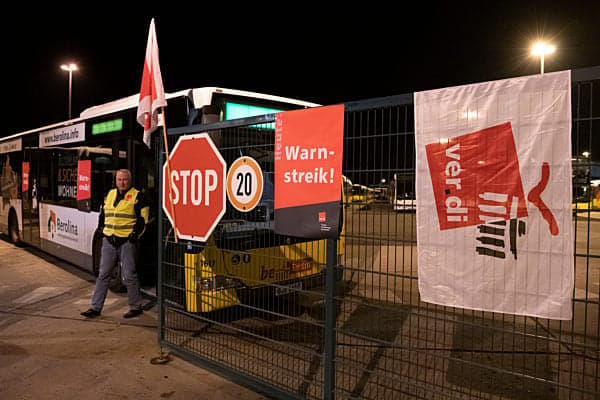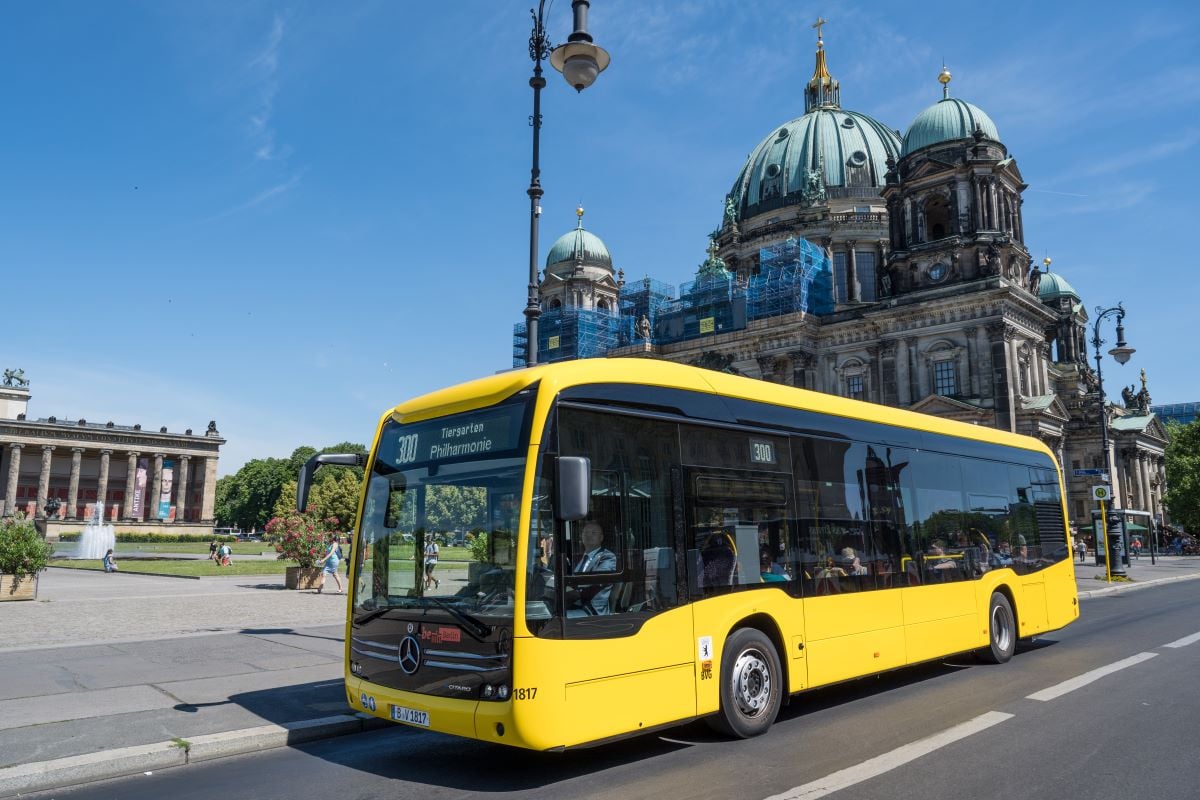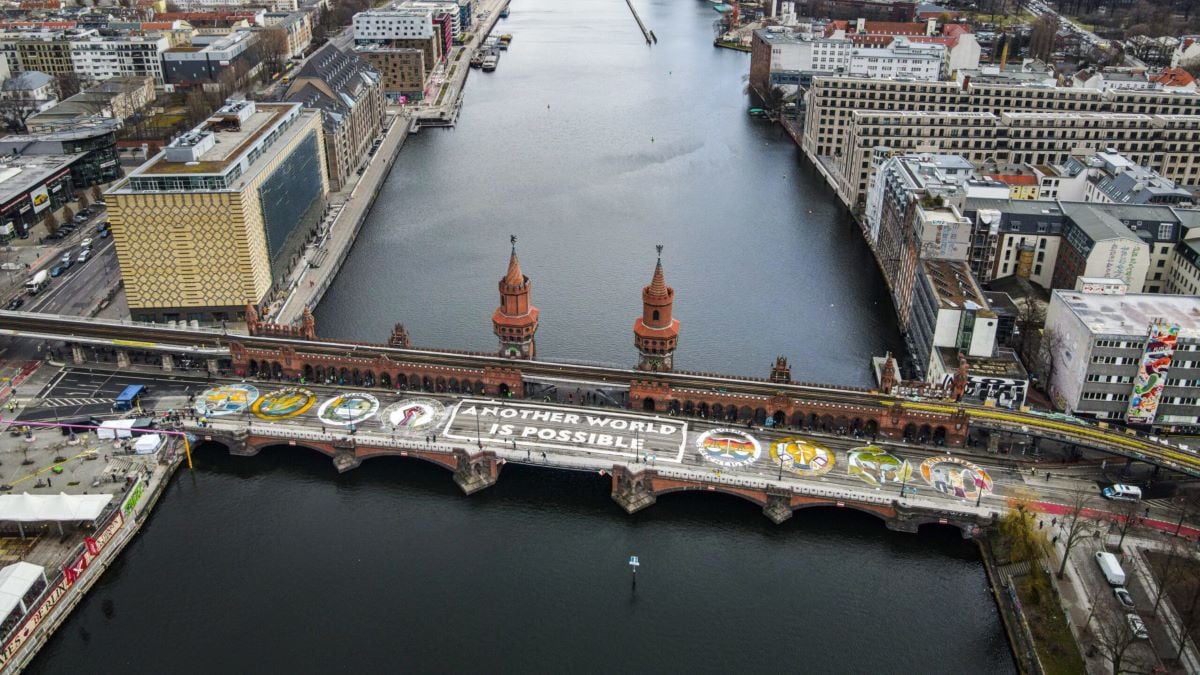'No family life': A Berlin bus driver explains why public transport workers are striking

Many passengers will suffer bus and train delays and cancellations this week as public transport strikes sweep the country. But employees say these strikes are needed to improve working conditions. The Local speaks with a Berlin bus driver about union workers’ demands.
Up to 90,000 employees from local transportation companies across Germany are expected to stop work this week, as a series of strikes called by a number of trade unions including Verdi, NahVG, and dbb Beamtenbund and Tarifunion among others.
As of Tuesday, an initial strike has already concluded in Berlin, but another longer strike is planned for Thursday February 29th and Friday, March 1st up until 2pm, and will coincide with a ‘climate strike’ announced by Fridays for Future.
Passengers that depend on local buses and trains may feel that transportation strikes are inappropriate or excessive, especially when they happen at the rate that they are in Germany this year. But transportation workers say the demands presented by their working schedules are unsustainable.
READ ALSO: Where are public transport strikes taking place this week in Germany?
The Local speaks with Mathias Kurreck, a bus driver and Verdi union member who has worked with Berliner Verkehrsbetriebe (BVG) for several years, to understand why bus drivers are striking and what they hope to gain.

Bus driver and Verdi union member, Mathias Kurreck has worked for BVG for 17 years. Photo provided by Kurreck.
A high-pressure job with no time for breaks
Mathias told The Local that the level of stress on Berlin’s bus drivers has been increasing. He cites heavy traffic – compounded by construction sites and events – as well as tight transportation timetables and a lack of off-time, as the leading issues.
Currently BVG bus drivers are given just four minutes of ‘turn around’ time at the end of their route. Drivers are asking that the minimum rest time at end points be extended to 10 minutes.
“We're always late,” Mathias said. “The driver has so little time to turn around that he has to decide whether to go to the toilet or take a bite of sandwich, both of which are not possible.”
Additionally BVG drivers want the rest period between their shifts extended from 11 hours to 12.

A BVG bus passes through central Berlin. Photo provided by BVG.
As required by law, all workers in Germany are entitled to at least 11 hours of rest time between two scheduled shifts. But for bus and train drivers, who need to commute to transit hubs on the outskirts of the city to start and end their shifts, 11 hours of rest time is reduced to significantly less time at home.
“We have transfer points throughout the city…travel distances of 1.5 hours each way are commonplace,” Mathias said, adding that in these cases he’s left with eight hours for eating, sleeping and taking care of the family. “There is no family life and many relationships and marriages fall apart because of shift work.”
Finally, BVG drivers would like to increase their vacation allowance to 33 days per year.
READ ALSO: Why Germany is being hit by more strikes almost every day
Asked about the company’s perspective on these demands, BVG told The Local that, “We do not comment on the content and core issues of the ongoing collective bargaining negotiations.”
But in a press release that BVG published ahead of this week’s strikes, the company called the action “completely disproportionate and irresponsible with regard to our passengers”.
Employee turnover is high, and public transportation companies can’t find enough drivers
“Many of my colleagues leave the profession within two years,” Mathias told The Local – suggesting that lack of adequate break times, and demanding schedules are primarily to blame.
For its part, BVG seems to agree that staffing issues are a serious challenge. “The topic of personnel recruiting is at the top of BVG's list of priorities,” BVG told The Local.
But how BVG thinks it can attract and retain workers is wildly different from how Mathias thinks the company should do so.
“In order to attract new colleagues, including for the transport service, we have intensified our recruiting activities with a strong campaign that focuses specifically on the topic of diversity,” BVG said.
Mathias, on the other hand, has a laundry list of working conditions that he says BVG could improve to retain more of their employees and attract new ones, including: not scheduling six-day work weeks, ensuring predictable schedules for drivers, market-based pay, improved break rooms, updating vehicle technology, and abolishing cash transactions on buses.
“Transport companies have to think intensively about employee retention and recruitment…They should ask why do people leave, or why don't they come to us?” he said.
City-wide infrastructure issues make for added challenges
Interestingly, Mathias thinks that the Berlin Senate could also do quite a bit more to improve the lives of public transportation workers.
He called Berlin the “capital of construction sites”, and noted that delays caused by poorly set-up construction zones eat into drivers’ break times.
He also noted that some bus line endpoints lack toilets for drivers, and that “The Senate usually refuses to let us install the toilets because they don't fit into the cityscape…”
On this point BVG seems to fully agree. “We also believe that infrastructure plays a role in the attractiveness of the profession for our drivers. It's also about quality for our passengers,” the company said.
Mathias would like to see certain lanes limited to bus use and more priority switching for buses and trams at traffic lights.
“The faster we can travel in the city, the more stable the timetable is and the fewer drivers we need,” Mathias said. “A one kilometre per hour loss in average speed amounts to 100 additional drivers.”
What's next for Mathias and his union fellow union members?
On Friday, while Berlin and a number of other cities across Germany are crippled by public transportation strikes, Mathias plans to attend Fridays for Future and Verdi’s joint climate strike at Berlin’s Invalidenpark at 10 am.
“Our Campaign #WirFahrenZusammen (we travel together) unites the climate movement with local transport workers to work together for better working conditions and doubling public transport capacity by 2030,” explains Friday’s for Future on their website.

A Friday's for Future art action on Berlin's Oberbaum Bridge. The organisation says good public transport is essential to ensure that everyone can get from A to B easily and sustainably. Photo provided by Fridays for Future.
Mathias agrees that the challenges he and his colleagues face at work are linked to the challenge of creating better, more sustainable transportation systems. He also takes the argument a step further, linking it to threats to a democratic society.
“With austerity measures in all areas of life, we are creating space for right-wing ideas…” he explains. “We as unions, society, and activists have to work to reach out to people with unresolved questions and convince them that a left-wing future is a future in which everyone is welcome.”
Comments
See Also
Up to 90,000 employees from local transportation companies across Germany are expected to stop work this week, as a series of strikes called by a number of trade unions including Verdi, NahVG, and dbb Beamtenbund and Tarifunion among others.
As of Tuesday, an initial strike has already concluded in Berlin, but another longer strike is planned for Thursday February 29th and Friday, March 1st up until 2pm, and will coincide with a ‘climate strike’ announced by Fridays for Future.
Passengers that depend on local buses and trains may feel that transportation strikes are inappropriate or excessive, especially when they happen at the rate that they are in Germany this year. But transportation workers say the demands presented by their working schedules are unsustainable.
READ ALSO: Where are public transport strikes taking place this week in Germany?
The Local speaks with Mathias Kurreck, a bus driver and Verdi union member who has worked with Berliner Verkehrsbetriebe (BVG) for several years, to understand why bus drivers are striking and what they hope to gain.

A high-pressure job with no time for breaks
Mathias told The Local that the level of stress on Berlin’s bus drivers has been increasing. He cites heavy traffic – compounded by construction sites and events – as well as tight transportation timetables and a lack of off-time, as the leading issues.
Currently BVG bus drivers are given just four minutes of ‘turn around’ time at the end of their route. Drivers are asking that the minimum rest time at end points be extended to 10 minutes.
“We're always late,” Mathias said. “The driver has so little time to turn around that he has to decide whether to go to the toilet or take a bite of sandwich, both of which are not possible.”
Additionally BVG drivers want the rest period between their shifts extended from 11 hours to 12.

As required by law, all workers in Germany are entitled to at least 11 hours of rest time between two scheduled shifts. But for bus and train drivers, who need to commute to transit hubs on the outskirts of the city to start and end their shifts, 11 hours of rest time is reduced to significantly less time at home.
“We have transfer points throughout the city…travel distances of 1.5 hours each way are commonplace,” Mathias said, adding that in these cases he’s left with eight hours for eating, sleeping and taking care of the family. “There is no family life and many relationships and marriages fall apart because of shift work.”
Finally, BVG drivers would like to increase their vacation allowance to 33 days per year.
READ ALSO: Why Germany is being hit by more strikes almost every day
Asked about the company’s perspective on these demands, BVG told The Local that, “We do not comment on the content and core issues of the ongoing collective bargaining negotiations.”
But in a press release that BVG published ahead of this week’s strikes, the company called the action “completely disproportionate and irresponsible with regard to our passengers”.
Employee turnover is high, and public transportation companies can’t find enough drivers
“Many of my colleagues leave the profession within two years,” Mathias told The Local – suggesting that lack of adequate break times, and demanding schedules are primarily to blame.
For its part, BVG seems to agree that staffing issues are a serious challenge. “The topic of personnel recruiting is at the top of BVG's list of priorities,” BVG told The Local.
But how BVG thinks it can attract and retain workers is wildly different from how Mathias thinks the company should do so.
“In order to attract new colleagues, including for the transport service, we have intensified our recruiting activities with a strong campaign that focuses specifically on the topic of diversity,” BVG said.
Mathias, on the other hand, has a laundry list of working conditions that he says BVG could improve to retain more of their employees and attract new ones, including: not scheduling six-day work weeks, ensuring predictable schedules for drivers, market-based pay, improved break rooms, updating vehicle technology, and abolishing cash transactions on buses.
“Transport companies have to think intensively about employee retention and recruitment…They should ask why do people leave, or why don't they come to us?” he said.
City-wide infrastructure issues make for added challenges
Interestingly, Mathias thinks that the Berlin Senate could also do quite a bit more to improve the lives of public transportation workers.
He called Berlin the “capital of construction sites”, and noted that delays caused by poorly set-up construction zones eat into drivers’ break times.
He also noted that some bus line endpoints lack toilets for drivers, and that “The Senate usually refuses to let us install the toilets because they don't fit into the cityscape…”
On this point BVG seems to fully agree. “We also believe that infrastructure plays a role in the attractiveness of the profession for our drivers. It's also about quality for our passengers,” the company said.
Mathias would like to see certain lanes limited to bus use and more priority switching for buses and trams at traffic lights.
“The faster we can travel in the city, the more stable the timetable is and the fewer drivers we need,” Mathias said. “A one kilometre per hour loss in average speed amounts to 100 additional drivers.”
What's next for Mathias and his union fellow union members?
On Friday, while Berlin and a number of other cities across Germany are crippled by public transportation strikes, Mathias plans to attend Fridays for Future and Verdi’s joint climate strike at Berlin’s Invalidenpark at 10 am.
“Our Campaign #WirFahrenZusammen (we travel together) unites the climate movement with local transport workers to work together for better working conditions and doubling public transport capacity by 2030,” explains Friday’s for Future on their website.

Mathias agrees that the challenges he and his colleagues face at work are linked to the challenge of creating better, more sustainable transportation systems. He also takes the argument a step further, linking it to threats to a democratic society.
“With austerity measures in all areas of life, we are creating space for right-wing ideas…” he explains. “We as unions, society, and activists have to work to reach out to people with unresolved questions and convince them that a left-wing future is a future in which everyone is welcome.”
Join the conversation in our comments section below. Share your own views and experience and if you have a question or suggestion for our journalists then email us at [email protected].
Please keep comments civil, constructive and on topic – and make sure to read our terms of use before getting involved.
Please log in here to leave a comment.